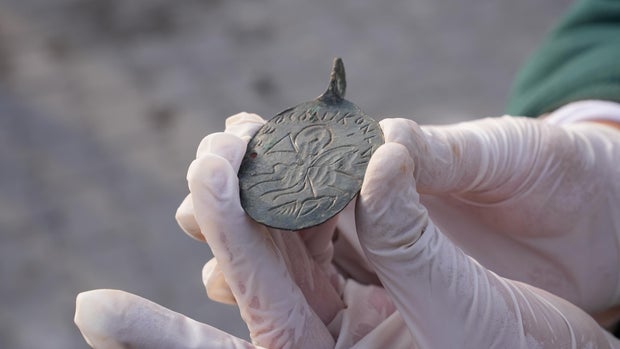Archaeologists in Turkey say they have discovered an ancient amulet depicting a Biblical figure in a battle against the devil.Â
The rare artifact was found during an ongoing excavation project in Hadrianopolis, an ancient city near KarabĂĽk, and dated to the fifth century.Â
Hadrianopolis was used as a settlement during various periods of history, including during the Roman and Byzantine empires. Excavation and restoration work has been taking place there since 2003, with over a dozen buildings discovered and multiple massive mosaics found over the years.Â
The pendant, made of bronze, shows King Solomon, according to a news release issued by Turkey’s KarabĂĽk University. The ancient ruler is seen riding a horse and holding a spear while defeating the devil, according to Dr. Ersin ÇelikbaĹź, an associate professor at the university. Solomon appears in multiple religions, including Judaism, Catholicism and Islam.Â
KarabĂĽk University
“The depiction of Prophet Solomon on this necklace surprised us and revealed the importance of the artifact for Anatolian archaeology,” said ÇelikbaĹź. Anatolia is a region of Turkey.Â
The phrase “Our Lord defeated evil” is written on one side of the amulet, and the names of four biblical angels – Azrail, Gabriel, Michael and Israfil – are written on the other side. The pendant would have been used as a charm to protect against evil or danger, ÇelikbaĹź told LiveScience.Â
ÇelikbaĹź added that the amulet is related to the military nature of the city, noting that previous excavations had “determined the existence of a cavalry unit” in Hadrianopolis. This is the first pendant of its kind to be found in Turkey, ÇelikbaĹź said, though a similar piece was once found in Jerusalem.Â
“The presence of similar works in these two distant geographies indicates that Hadrianopolis was an important religious center in ancient times,” ÇelikbaĹź said.Â

